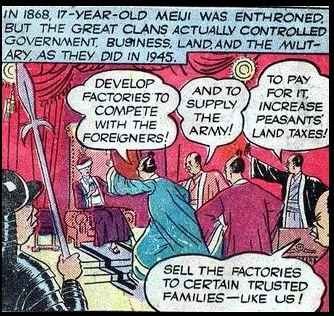Rise of Imperialism in Japan
by Devender
0 1876
- Japan was an independent country but its independence came under threat in 1850s.
- Industrialization in Japan:
- Nationalism and Education:
- Absolutism in Japan:
- Minister reported to Emperor and not to parliament.
- Emperor was called as the Divine
- Ministers and parliament had no say in appointment of Army and navy officers
- Parliament had limited finance
- Voting rights were only given to 3% of the total population
- Sino-Japan War:
- Fomasa which is now knows as Taiwan was occupied by Japan
- Senkaku islands in South China sea went under control of Japan.
- Manchuria has high coal and mineral resources and came under control of Japan
- Russo-Japan war:
- In 1910, Japan got control of Korea
- Russia gave half of Sakhalin islands to Japan
- Japan got Manchuria and almost port Arthur
- Japan invasion of Manchuria:
- This was insufferable behind the scenes of the Economic Crisis of 1929.
- Armed force attacked Manchuria in 1931 without the public authority's information and the Prime Minister was murdered in 1932 when he went against the intrusion.
- Till 1945, it was the Army that ran the country. The Emperor appreciated high glory yet he additionally neglected to control the Japanese imperialism since he feared his orders not being followed.
- So, it was the Army and not the chosen government, which was liable for Imperialism in 1930s.
- Second Sino-Japan war:
Rise of Imperialism in Japan
In 1853, US sent a naval fleet to Japan shores. The main aim was to coerce Japan into opening its two ports for trade and US ships. Such similar treaties were signed with European nations in coming years.
A political revolution took place in Japan due to which the feudal-military government was thrown out of role and a new government was formed under emperor Meiji. From 18768 to 1908, Japan emerged as a industrial nation where initially government took the responsibility to set up industries and invested a lot in it but later sold it to capitalists. These capitalists soon became self-sufficient and didn't require government support anymore.

Government introduced an efficient education programme that made sure population gets literate rapidly. This step provided the required skilled workforce for rapid growth of industry.
Extreme Nationalism and worshipping the emperor was an important part of education. It also inspired people to work hard for national growth and justified Imperialism which was about to happen.
In 1899, Japan established a new constitution under which:
It resulted in domination of armed forces on political affairs of Japan.
Imperialist Japan
This war was fought between Japan and China between 1894 and 1895. This conflict was battled basically over Korea, which was heavily influenced by China. After the misfortune, China perceived Korea as an Independent state. However, Japan occupies Korea in 1910. China had to pay about $150 million to Japan as a compensation for damages of War. The result of this war was:
It was fought over Manchuria and Japan won this war, taking over the Russian possession in China. More China territory was under Japanese control.
This war resulted in declaring Japan a major world power. U.S.A was against Russian domination and hence made secret deals with Japan to allow US trade freely in the Chinese areas. US even forced Russia to recognize Japan's territorial gains.
US began the policy of Appeasement towards Japan, it boosted Japan's imperialism and allowed it to become a major world power. Japan also became a rival of US in the Pacific.
Japan attacked Manchuria in 1931 and set up the manikin state. From 1931 ahead, incidents of Japanese aggression against China proceeded. In Manchuria, Chinese organizations were attempting to supplant the Japanese organizations and Japanese exchange and organizations were in danger.
It was bought between China and Japan from 1937 to 1945. It was a part of the Second world-war and Japan initiated a full scale invasion on China.

Share:







Comments
Waiting for your comments